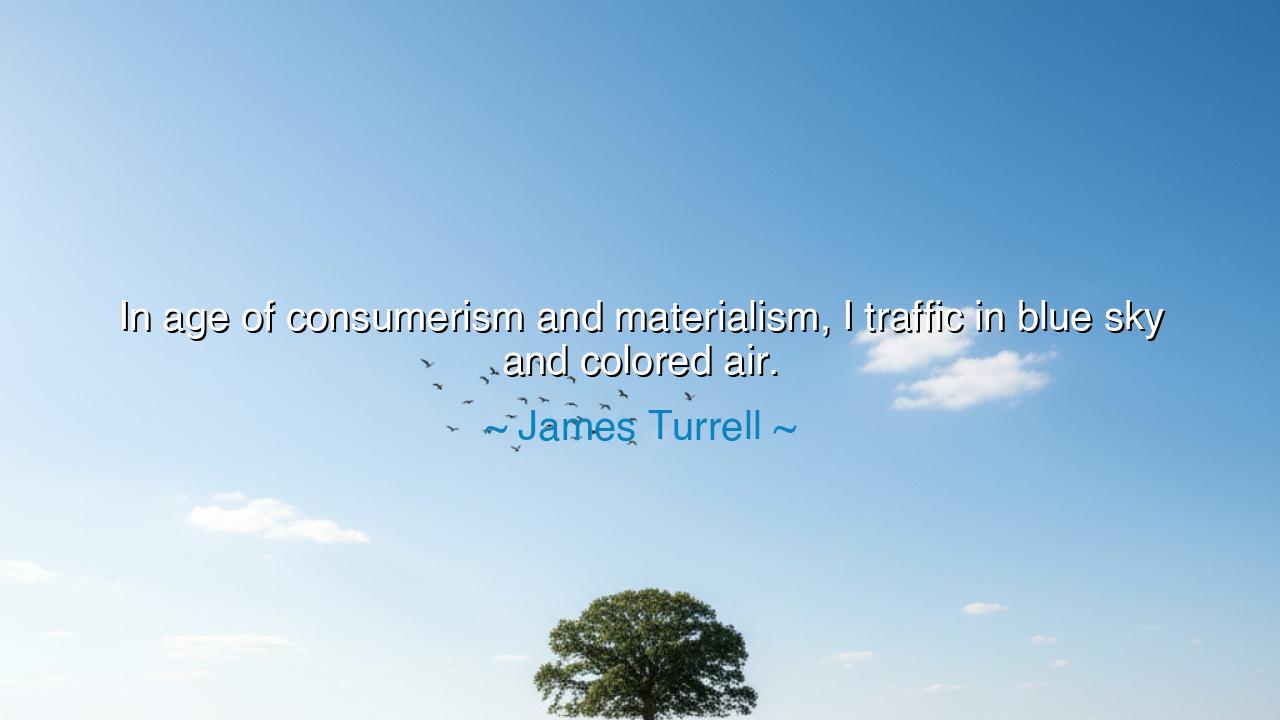
In age of consumerism and materialism, I traffic in blue sky and






"In an age of consumerism and materialism, I traffic in blue sky and colored air." These words from James Turrell are a powerful commentary on the state of our modern world, where the drive for material wealth often obscures the more ethereal aspects of life. Turrell, an artist known for his work with light and space, uses this evocative statement to express his dedication to the invisible, to the sensory experience of light, and to a life that values the intangible over the tangible. In a world that constantly urges us to consume, to accumulate possessions and wealth, Turrell's quote serves as a reminder that there is more to life than what we can touch, buy, or sell. His work in light is a deliberate rejection of the consumerist mindset, offering instead a deep reflection on what it means to be fully present, to experience the pure beauty of existence without the interference of material desire.
The ancients understood the value of the intangible, the idea that there is a deeper reality beyond the physical world. Plato, in his philosophy, spoke of the world of forms, a realm of eternal truths and beauty that exists beyond the material realm. For Plato, the physical world was but a shadow, a reflection of something greater. Similarly, the Stoics, such as Epictetus and Marcus Aurelius, taught that true freedom and happiness come not from external possessions, but from the cultivation of inner virtue and the ability to embrace life’s impermanence with equanimity. They saw the pursuit of material goods as a distraction, a delusion that could never provide the true fulfillment that comes from understanding the world through the lens of wisdom and virtue. In this sense, Turrell’s quote aligns with the ancient teachings: the quest for more stuff can never satisfy the deeper longing for meaning and connection.
Turrell's work with light is, in many ways, a modern reflection of this ancient wisdom. By manipulating light and space, he seeks to draw attention not to the physical objects in our world, but to the sensory experience of light itself—the way it shapes our perceptions and connects us to the vast, invisible world around us. Just as the ancient philosophers sought to guide their followers toward a deeper understanding of existence through contemplation of the unseen, Turrell’s art encourages us to experience the world in a way that is less about accumulation and more about awareness. His blue sky and colored air are not tangible commodities; they are experiences that invite us to pause, to reflect, and to reconnect with the mystery of existence.
The story of Henry David Thoreau provides an apt historical example of living against the grain of materialism. In his famous work Walden, Thoreau deliberately distanced himself from the trappings of society’s consumerism and sought a simpler, more authentic life in nature. Thoreau’s time at Walden Pond was not about the accumulation of possessions or wealth but about immersing himself in the natural world to find a deeper truth about existence. For Thoreau, nature was the great teacher, and the pursuit of material gain was a distraction from the real purpose of life—to seek spiritual and personal growth. Just as Thoreau found profound meaning in the simple observation of nature, Turrell’s work invites us to engage with the world through a more contemplative lens, seeing beauty in the intangible and the ephemeral.
In the modern world, where the pursuit of material goods has become a dominant force in shaping our lives, Turrell’s words serve as a reminder of the importance of stillness, presence, and the intangible aspects of life. In a world that tells us to constantly strive for more, Turrell offers us the possibility of finding fulfillment in the invisible and the transitory—the light, the air, the sky. This is not to deny the importance of physical reality, but rather to suggest that there is more to life than what we can touch or own. The world of light that Turrell creates encourages us to shift our focus from the material to the spiritual, from the finite to the infinite.
The lesson in Turrell’s words is simple, yet profound: the search for happiness and fulfillment cannot be found in the accumulation of material goods, but in the ability to embrace the beauty and mystery of life’s intangible elements. Just as the ancients recognized that the true essence of life lies beyond the material, Turrell’s work invites us to look up, to feel the light, to breathe the air, and to find meaning in the simplest, most elusive experiences. We must learn to value the things that cannot be owned, the experiences that nourish our souls rather than our wallets. In this way, we can begin to transcend the consumerist mindset and reconnect with the deeper, more lasting aspects of existence.
In practical terms, we can apply this lesson by cultivating a practice of mindfulness and awareness in our daily lives. Instead of focusing on the accumulation of things, we can turn our attention to the beauty around us, the moment we are living in, and the connections we are forming with others. By embracing the intangible—whether through the appreciation of nature, the practice of gratitude, or the pursuit of inner peace—we can begin to shift our perspective and find greater fulfillment. Let us remember Turrell’s wisdom: that true contentment lies not in the things we own, but in the joy we find in the world around us, in the light that illuminates our path and the air we breathe.






AAdministratorAdministrator
Welcome, honored guests. Please leave a comment, we will respond soon